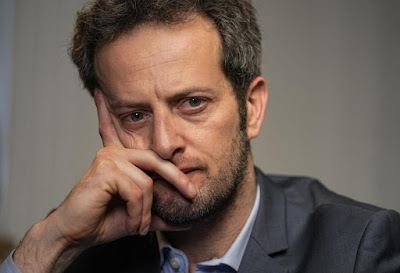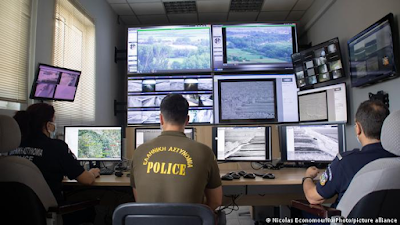FILE - Migrants walk under moonlight next to an inflatable boat before attempting to enter Greece from Turkey by crossing the Evros river, also known as Maritsa river, near Edirne, Turkey, March 8, 2020. (AP Photo/Felipe Dana, File)
BARCELONA, Spain (AP)
— A French woman accused Greek authorities Friday of forcing her and other
migrants back across the border into Turkey, violating her rights both as a
person fleeing persecution and as a European citizen. In court documents
seen by The Associated Press, the 32-year-old woman, who has Turkish as well as
French citizenship, claims she and her husband were trying to flee Turkey to
escape prison sentences that were politically motivated. They crossed the
Evros River by boat into Greece on the way to France, where the woman was born
and raised. But she says Greek officials mistreated her and turned her back;
she is now in prison in Turkey. From her cell, the woman, who asked to remain
anonymous for her safety, filed a lawsuit against Greece on Friday at the European
Court of Human Rights. While so-called
“pushbacks” of migrants have become increasingly common despite violating
European and international law, experts say the French woman’s story appears to
be the first such case brought to court involving a European citizen. “We have moved from
allegations to it being a public secret that pushbacks are engaged in by the
Greek authorities on a regular basis,” said Hanne Beirens, director of
Migration Policy Institute Europe. “This would be quite a unique case…Because
it would show how indiscriminately the Greek authorities are acting and how it
affects people from all backgrounds.” For years,
journalists, lawyers and human rights organizations have documented pushbacks
by Greece of migrants and refugees across sea or land borders, denying them the
right to asylum procedures. Under the principle of non-refoulement in European
and international human rights law, people cannot be returned to a country
where they would face torture, punishment or harm. Greek authorities did
not respond to multiple requests for comment sent by the AP to the Ministry of
Migration and Asylum, the Ministry of Citizen Protection and the Greek Embassy
in Paris. However, Greece released a statement Thursday evening after a joint
media investigation alleged a separate pushback involving two asylum-seekers
later found dead on the Aegean coast. “Greece protects the
external borders of the European Union, in full compliance with international
law and in full respect of the charter of fundamental rights,” Greek Migration
and Asylum Minister Notis Mitarachi said, At least 21 migrants
have died on the land border between Turkey and Greece so far this year
according to the International Organization for Migration’s Missing Migrants
Project. The United Nations
agency issued a statement Friday saying it was “alarmed by mounting migrant
deaths and continuous reports of pushbacks at the European Union (EU) border
between Greece and Turkey.” “Such actions are not
in line with and oppose States’ commitments and obligations under international
and regional law, such as the violation of the principle of non-refoulement,”
the IOM statement said. The French woman’s
story is laid out in court statements from her, her husband and her sister,
including illustrations she did from prison. The AP also drew on interviews in
Paris with the sister and one of the woman’s lawyers; documents including her
French passport, French national ID and French marriage papers; emails, call
logs, and screen shots of texts and GPS data the woman shared in real time with
a lawyer. Born in France to
Turkish parents, the woman left France in 2013 to pursue undergraduate studies
in Turkey. In April 2018, she and her now-husband were among dozens of students
rounded up and accused of belonging to the “Fethullahist Terror Organization”
or FETO. The couple deny all accusations. At the time, Turkey
had launched a massive crackdown against followers of U.S.-based Muslim
preacher Fethullah Gulen, after a failed military coup in 2016. The government
designated the network as a terrorist organization and sentenced close to 5,000
people to prison, according to the state-run Anadolu Agency. The French woman was
detained for 11 days but released on parole. A few months later, she was
sentenced to more than six years in prison, which she appealed. In June last
year, her prison sentence and her husband’s were confirmed by the Supreme
Court. They ultimately decided to flee, selling the family jewelry to pay
smugglers to get to Greece. The woman’s family
trusted that once she stepped foot in Greece, a European Union country and part
of the Schengen area, Europe’s visa-free travel zone, she would be safe. As the
couple crossed Greece’s eastern border on the morning of Oct. 19, 2021, her
family anxiously awaited news from their home 90 km outside Paris. They
followed the woman’s movements on a real-time location tracking app. At 9:38 a.m., the
woman sent a text message on What’sApp: “We have passed.” Her family proceeded
to contact both French and Greek authorities, saying the couple needed help. “They are victims of
persecution by the current Turkish government,” read their email, which they
followed up with phone calls. “We are VERY VERY worried for them!” Shortly after, Greek
officials stopped the couple, the lawsuit alleges. After they presented her
French ID, a copy of her French passport and the French family booklet that
proved their marriage, the officers asked them to kneel. They then took the
couple’s telephones, power bank, clothes and food and cut their shoelaces,
according to the statement. The woman says they
were taken in the back of a truck to a “closed box” inside a gated area and
kept there for hours with other migrants, some from Afghanistan who were
barefoot. She says officers slapped one of them. Meanwhile, in France,
her family had lost contact with her and was getting increasingly worried. Her
sisters scrambled to call and email both Greek and French authorities. After they shared
their concern that their sister would be returned to Turkey, an official at the
Greek embassy in Paris sent a text message in French: “Since she has a French
passport, there is no problem(...)Calm down. There is no danger in Greece.” The man confirmed to
the AP that he had been in contact with the woman’s family but said he was not
authorized to speak to the press. Requests for comment to the Greek embassy in
Paris were not answered. The woman’s family say they also exchanged several
phone calls with the French consulate in Thessaloniki, and sent an email with
the woman’s last known location and a copy of her passport. After being detained
for several hours, the migrants were rounded up onto a truck and taken to the
Evros river, the woman says. They were made to board an inflatable boat without
life vests. “We continued to beg
them not to send us back, explaining to them I was French and that we were
persecuted in Turkey,” she says in her statement. She spoke to
officials in French and English, to no avail. They were caught by Turkish
soldiers on the other side and taken to a police station, she says. The next
day, they were in prison. “We are totally
disappointed with Greek authorities,” her sister told the AP in Paris, asking
to remain anonymous to protect her safety. “We didn’t think they would return a
persecuted person back to the persecutor.” “We are equally
disappointed with French authorities because we were abandoned,” she said. Since then, she said,
her family has written countless letters to French and European Union lawmakers
and officials, and even to French President Emmanuel Macron, asking for help.
The French Ministry for Europe and Foreign Affairs told the AP in a written
statement that officials in Paris, Greece and Turkey “had maintained a close
relationship with (the woman’s) family from the moment they were alerted to her
situation.” They said they are
also seeking a consular visit to the woman in prison in Turkey. There, she told
her sister, she has been stripped naked for searches three times. In the first
prison she was taken to, she said, she shared a cell with mice. Catherine Briddick, a
lecturer in International Human Rights and Refugee Law at Oxford University,
said the woman’s case “shows the absurdity of Fortress Europe.” “(It) should give
pause to European citizens everywhere to think about what these policies are
doing to us, as well as to the people we’re trying to keep out,” she said. Omer Shatz, a lawyer
representing the French woman along with Violeta Moreno-Lax and Francesco
Gatta, argues their client was a victim of increasing racial discrimination at
the borders of Europe. “She was really
begging to them, showing them her (French) IDs and travel documents but was
ignored,” said Shatz, legal director of Front-Lex, which challenges EU
migration policies. “Why? Because the way she looks. Probably Muslim, probably
looking like a refugee, probably not white.” Migration has been
brought to the center stage of the French presidential campaign, with both
Macron and his opponents on the right and far-right taking ever stronger
stances against irregular crossings. European countries have spent billions on
surveillance technology at their borders, despite growing accusations of human
rights violations. A European Commission
spokesperson said it doesn’t comment on ongoing legal proceedings but is
“concerned about any reports of pushbacks and mistreatment....Efficient border
management must be firmly rooted in the respect of human dignity and the
principle of non-refoulement.” The French woman’s family says they received a
similar response to a letter they sent the commission. “The EU,
unfortunately, has declared that Greece was the shield of Europe…it frees the
Greek authorities from many constraints,” said Francois Crepeau, a professor at
McGill University in Canada and a former UN special rapporteur on the human
rights of migrants. While in public many European officials will condemn pushbacks
as illegal, he said, “in fact, they’re quite happy that Greece is doing the
dirty job for everyone else.”
AP journalists
Theodora Tongas in Athens, Greece and Elaine Ganley in Paris, contributed to
this report.
18/2/2022
https://apnews.com/article/middle-east-france-prisons-greece-europe-1c58212ff10310deebae2b769d31e386 | 














